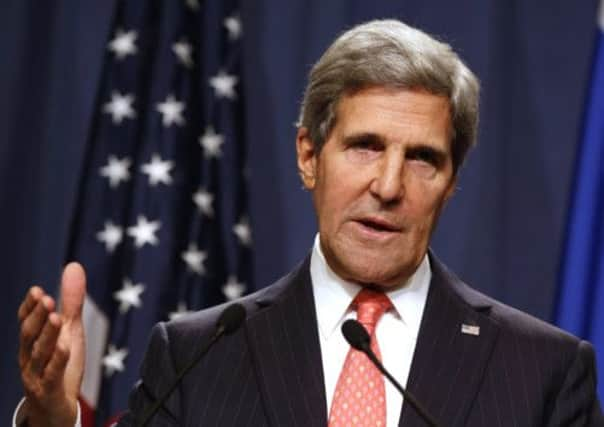Syria: Deal hailed that averted US air strikes


As president Bashar al-Assad’s warplanes and artillery hit rebel suburbs of the capital again yesterday, cabinet minister Ali Haidar told Moscow’s RIA news agency: “These agreements … are a victory for Syria, achieved thanks to our Russian friends.”
UN inspectors are preparing to submit their report on the chemical weapons attack to UN secretary-general Ban Ki-moon today. He will then report the findings to the UN security council.
Advertisement
Hide AdAdvertisement
Hide AdThough not close to Mr Assad, Mr Ali was the first Syrian official to react to Saturday’s deal struck in Geneva by US secretary of state John Kerry and Russian foreign minister Sergei Lavrov. Bridging an angry East-West rift over Syria, they agreed to back a nine-month UN programme to destroy Syria’s chemical arsenal.
Mr Kerry responded to widespread scepticism about the feasibility of the plan by saying in Israel that it had “the full ability” to remove all Syria’s chemical weapons.
“The threat of force is real and the Assad regime and all those taking part need to understand that president Obama and the United States are committed to achieve this goal,” Mr Kerry said in Jerusalem, where he briefed Israeli leaders on the agreement.
The agreement has effectively put off the threat of air strikes the US made after poison gas killed hundreds of Syrian civilians on 21 August, although he stressed that force remains an option if Mr Assad reneges.
Mr Obama embraced the disarmament proposal put forward last week by Russia’s president Vladimir Putin after his plan for US military action hit resistance in Congress. Legislators feared an open-ended new entanglement in the Middle East and were troubled by the presence of al-Qaeda followers among Mr Assad’s opponents.
In an interview with ABC television yesterday, Mr Obama said criticism of his quick-changing tactics on Syria was about style rather than substance. And while welcoming Mr Putin’s willingness to press his “client, the Assad regime” to disarm, he also chided the Kremlin leader for suggesting rebels carried out the gas attack.
Defending his changes of tack on Syria, Mr Obama said: “Folks here in Washington like to grade on style … Had we rolled out something that was very smooth and disciplined and linear, they would have graded it well – even if it was a disastrous policy.”
National reconciliation minister Mr Ali said Syria welcomed the terms of the US-Russia deal: “They will help Syrians get out of the crisis,” he said. “They have prevented a war against Syria by denying a pretext to those who wanted to unleash it.”
Advertisement
Hide AdAdvertisement
Hide AdHe also echoed Messrs Kerry and Lavrov in saying it might help Syrians “sit round one table to settle their internal problems”. But rebels, calling the international focus on poison gas a sideshow, have dismissed talk the arms pact might herald peace talks and said Mr Assad has stepped up an offensive with ordinary weaponry now that the threat of US air strikes has receded.
Mr Assad’s key sponsor Iran hailed a US retreat from “extremist behaviour” and welcomed its “rationality”. Israel, worried that US leniency toward Mr Assad may encourage Tehran to develop nuclear arms, said the deal would be judged on results.
The Syrian government has formally told the United Nations it will adhere to a treaty banning chemical weapons. The US-Russian framework agreement calls for the UN to enforce the removal of existing stockpiles by the middle of next year.
An opposition activist in Damascus echoed disappointment among rebel leaders: “Helping Syrians would mean stopping the bloodshed,” he said. Poison gas is estimated to have killed only hundreds of the more than 100,000 dead in a war that has raged since 2011.